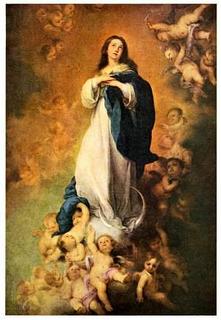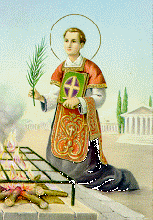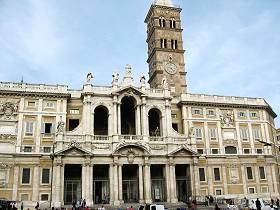Homily for the 22nd Sunday in Ordinary Time, Year A
Today’s Gospel picks up immediately following last week’s profound declaration of our Lord to St. Peter. Simon, we recall, had his name – and mission – changed to Rock. He was to be the rock of the Church, the foundation of Christ’s Body on earth. He received the “Keys to the Kingdom,” the power to “bind and loose,” and the promise that Christ’s Church would prevail against her enemies and the power of hell.
As our Lord continues His discourse, however, St. Peter begins to see the true consequences of being the “rock”. Christ opens to his disciples the awful truth of the Incarnation: the reality of suffering and death. Our Lord explains to them that He must suffer and be killed – and rise again. This is too much for the newly appointed “rock”. He wants the promises, to be sure, but isn’t capable of accepting them on Jesus’ terms. He thinks as we do, “conformed to this age.” Peter had yet to be transformed by the power of the Spirit, unwilling to allow Christ’s Sacrifice to be the foundation of the Church.
Why was this so awful? Because even in his refusal, St. Peter
knew the truth: that if Christ died, offering His life as a ransom for man, then he, too, would have to offer his own life in imitation of Christ’s. Christ, after silencing Peter, confirms his worst suspicions.
“Whoever wishes to come after me must deny himself, take up his cross and follow me.”
My dear brothers and sisters, are we prepared to make this commitment to Christ? Or are our minds conformed to this age? Do we reject the notion of redemptive suffering? Do we desire comfortable lives, minimizing our suffering at every turn? Have we rejected the message and meaning of the Cross in favor of “tolerance” and “niceness”? Are we comfortable thinking that other paths to salvation exist, as long as I am a “good person”?
We need to accept the power of the Cross today. We must be “duped” by the Lord, so that His Name becomes fire burning in our hearts, impossible to be kept in. We must be transformed by the renewal of our minds, prepared to offer our bodies as a living sacrifice. In short, my dear friends, we must be prepared to not just accept the Cross, but to
embrace it.
There is only one path to salvation, and it’s hanging on the wall behind me. Though we need not be terrified by the crucifix, it should in some measure sober our thoughts every day. “He must deny himself, take up his cross, and follow me.” When we see the Cross, do we understand its meaning? Until Christ offered Himself on the Cross, the gates of heaven were closed; by offering Himself to the Father on our behalf for all the sins of the world, Christ won Salvation for us. Without Calvary, without the agonizing bloody sacrifice of the Cross, none of us could have hope for salvation; we would stand justly condemned before God, destined to be apart from Him for all eternity.
But, thanks be to God, He sent His Son, not just as a good man, a wise prophet, or a fine example. God sent His Son, the Second Person of the Trinity, to reveal Himself and the meaning of total and complete self-giving, sacrificial love. In order for us to share in the live of Christ, we must share in His death.
What are the Crosses in your life? What heavy, burdensome Cross do you bear? Or perhaps, what Cross do we avoid?
Is the Cross in your life physical suffering? Is it the Cross of illness, old-age, or a physical handicap? Do you struggle with mental disorders, anxiety, or great stress?
Is someone else the Cross in your life? Do you struggle with a difficult parent, children, brothers and sisters, or a spouse? Is a co-worker, boss, or employee a Cross for you? Are fellow parishioners, or even your Associate Pastor, Crosses for you?
Is the Cross a Cross of temptation? Do you struggle with the Cross of pornography, contraception, gluttony, gambling, alcoholism? Does the Cross of abortion weigh down your soul? Do you struggle with a finances, bearing the Cross in this way? Are you lonely, hopeless, or just discouraged?
And as we start back to school, do you have a teacher who just seems to “have it in for you”? A class that you cannot stand, or have any luck with? Maybe you have a difficult student who is your Cross.
Each of us bears a Cross – many of us bear numerous Crosses daily. If I asked each of you, you would tell story after story of trial and difficulty. But they only become means of salvation when we lovingly accept them, and follow Christ with them. The Cross, after all, is not just meant to be carried. Christ
died on the Cross.
Is this the Good News of the Gospel? We’re just meant to bear these Crosses until they finally kill us? NO! Christ bears these Crosses with us; He holds us up, and supports us, and ultimately makes these burdens sources of grace and life. How do we do this, though? How are we meant to bear these Crosses, when we don’t have the strength on our own?
The real Good News is that Christ desires these burdens for Himself. Don’t hold in the weight of the Cross; cast it upon Jesus in love and in humility. By daily offering to Him the Crosses of our life, we grow in love of God and neighbor. Three ways stand out as excellent means to “offer up” the Crosses that we bear.
First, by penance, both in the Sacrament of Reconciliation, and the practice of penance. Offer to our Lord all your sins, your struggles, your temptations – everything – in the Sacrament. Bringing these burdens to the priest, and setting them in the context of the Cross, confident that Jesus forgives through His Church gives great peace. Then, by adopting small mortifications – little deaths – we prepare our souls to bear greater Crosses. What can we do? Abstain from meat on Fridays, or fast on Fridays; only drink water with our meals one day of the week; abstain from television, internet, movies – not because they’re bad, but out of love for Christ.
Secondly, by bringing these concerns to Mass. Especially at the Presentation of the Gifts, unite all your intentions to the Sacrifice of Christ. The Mass
is the Cross; it
is Calvary; the same One Sacrifice of our Lord occurs for our benefit. By placing our heart spiritually on the altar, along with all the struggles of our daily life, we bring them into the shadow of the Cross. Nothing is more powerful than the Sacrifice of the Mass for bringing our wills into union with Christ.
Finally, by extending the Mass in our own lives, first of all by making a thanksgiving after receiving Holy Communion, staying for a few moments after Mass to praise God for His goodness, and to apply the graces of Mass to our lives in some concrete way. Also, we should strive to spend some time – at least an hour – of prayer before the Blessed Sacrament each week. This could be before the tabernacle, or even better, in Eucharistic Adoration with the exposed Eucharist in a Monstrance.
Don’t let this opportunity for grace pass by. Today Christ holds out for us his own hands and shoulders to accept our Crosses. Cast them upon Him, for He is meek and humble of heart, and you will find rest for your souls.



